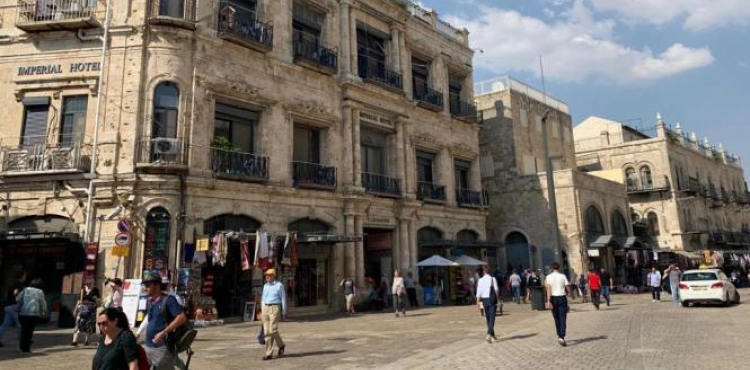A Christmas tree was erected at the entrance to the Imperial Hotel in the Old City of occupied East Jerusalem and decorated to mark the start of celebrations, but the threat of a possible evacuation of a nearby relative for the benefit of settler groups hangs over the festive atmosphere.
The Greek Orthodox Church owns the Imperial and Petra hotels, located at the entrance of Bab al-Khalil in the Christian Quarter of the Old City.
The Israeli Supreme Court approved in June the sale of property to the Greek Orthodox Church of the Jewish settlement of Ateret Cohanim after attempts by the Greek Orthodox Patriarchate failed to cancel the sale by challenging the decision of the Central Court, which approved the sale in 2017.
Last week there was a development in the case after an Israeli court decided to freeze the transfer and evacuation of property for settlers.
"The Patriarchate has obtained a court decision in absentia to freeze the sale due to the emergence of evidence revealing fraud and deception in the sale process," said Maher Hanna, a lawyer for the Dajani family.
Abu Walid Dajani, owner of the 48-room hotel with 48 rooms, has concerns that make him not optimistic.
"This decision is a double-edged sword," Abu Walid said.
The real estate issue dates back to 2004 when three Israeli companies linked to the settlement association Ateret Cohenim acquired a "monopoly" of properties owned by the Greek Orthodox Church.
The owner of the hotel, which he rented in 1949, continues to pay his 200,000 shekels (about $ 57,000) a year.
According to Dajani, the settlement association demands that he "pay about 10 million shekels instead of renting the property retroactively."
The spokesman for the Orthodox Church was not immediately available for comment.
Israel occupied East Jerusalem in 1967 and later annexed it in a move not recognized by the international community.
Israel regards all of Jerusalem as its undivided capital, while the Palestinians want East Jerusalem as the capital of a future state.
The Greek Orthodox Church, the main community in the Holy Land, is affiliated with some 200 million Christians around the world, with an estimated 90,000 members in Israel and the Palestinian territories.
The sale has angered Palestinians, who see the sale of East Jerusalem land and property to Jews as a betrayal, and fear that Israeli settlers may buy property in East Jerusalem.
The sale led to the displacement of the then Orthodox Patriarch Irenius I, who was replaced by Theophilus III.
Orthodox Christians in Palestine and Israel were divided between supporters and opponents of Patriarch Theophilos III, who some accused of selling property in the cities of Jaffa, Caesarea, Jerusalem and Haifa.
According to Hanna, the court will wait 30 days for the settlers to submit a defense order against the freeze.
"Our position has improved a lot and the freeze will make the issue harder for the settlers."
But the political analyst and researcher specialized in the history of the church endowments Elif Sabbagh believes that the timing of this decision serves the Patriarch Theophilus III.
"Freezing the decision, in my judgment, serves the Patriarch on the eve of Christmas celebrations to present himself as a victor and give him national coverage," Elif said.
For the political analyst, it is not clear whether the court will review the real estate transfer procedure or consider the ownership decision.
Sabbagh points to possible political intervention in order to return the property to the church, but "in return it will be double-valued properties."
A source from the settler association, Ateret Cohenim, said they were confident settlers would eventually take control of the outposts.
The deal made Ateret Cohenim the owner of most of the buildings located at the entrance to the Hebron Gate, one of the main gates of the Old City and the Arab market. All the processions of the Christian Patriarchs in their religious celebrations take place in Hebron.
A few meters from the Imperial Hotel overlooking Omar al-Khattab Square and where the tourist movement is active, the hotel is located in Petra, the second disputed property.
The four-storey hotel, with its eastern balconies overlooking the Patriarch´s Pool, the Church of the Holy Sepulcher and the Al-Aqsa Mosque.
The hotel has 40 rooms, only 20 of which are operational under the dilapidated position of all the facilities of the hotel, whose wooden stairs seemed broken and the floor of its tiles, and its walls cracked and smelled of moisture, factors all led to the reluctance of customers.
According to a representative of the Petra hotel, Israeli authorities are preventing the hotel from being renovated until the case ends. "We have a court decision not to renovate," he says, speaking on condition of anonymity. "Any breach of the decision means imprisonment or deportation from the old town.
As for the court´s decision to freeze the transfer of real estate, he says, "They are all liars. Since 2004, we wait and listen to promises. I want a clear and explicit decision written in an official paper."
For him, the decision to freeze means that they "won a battle but did not win the war."












